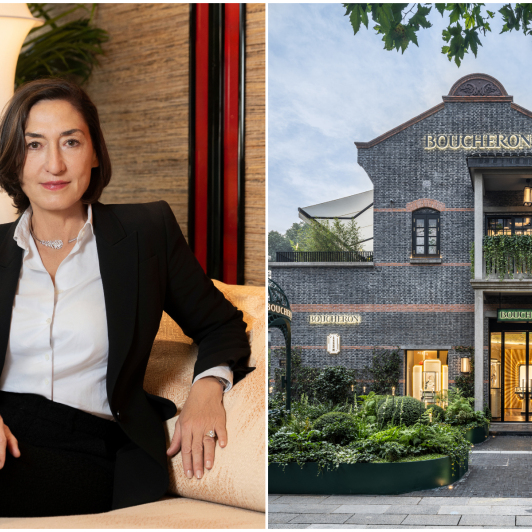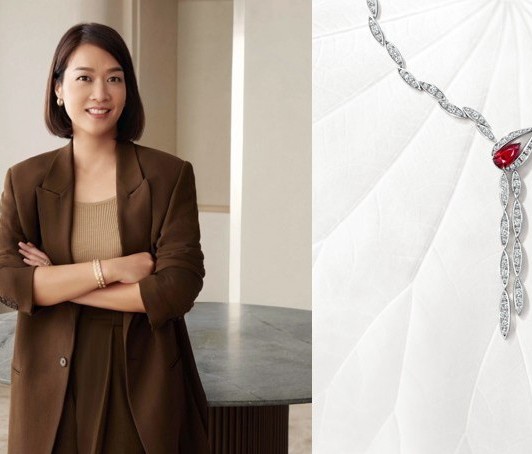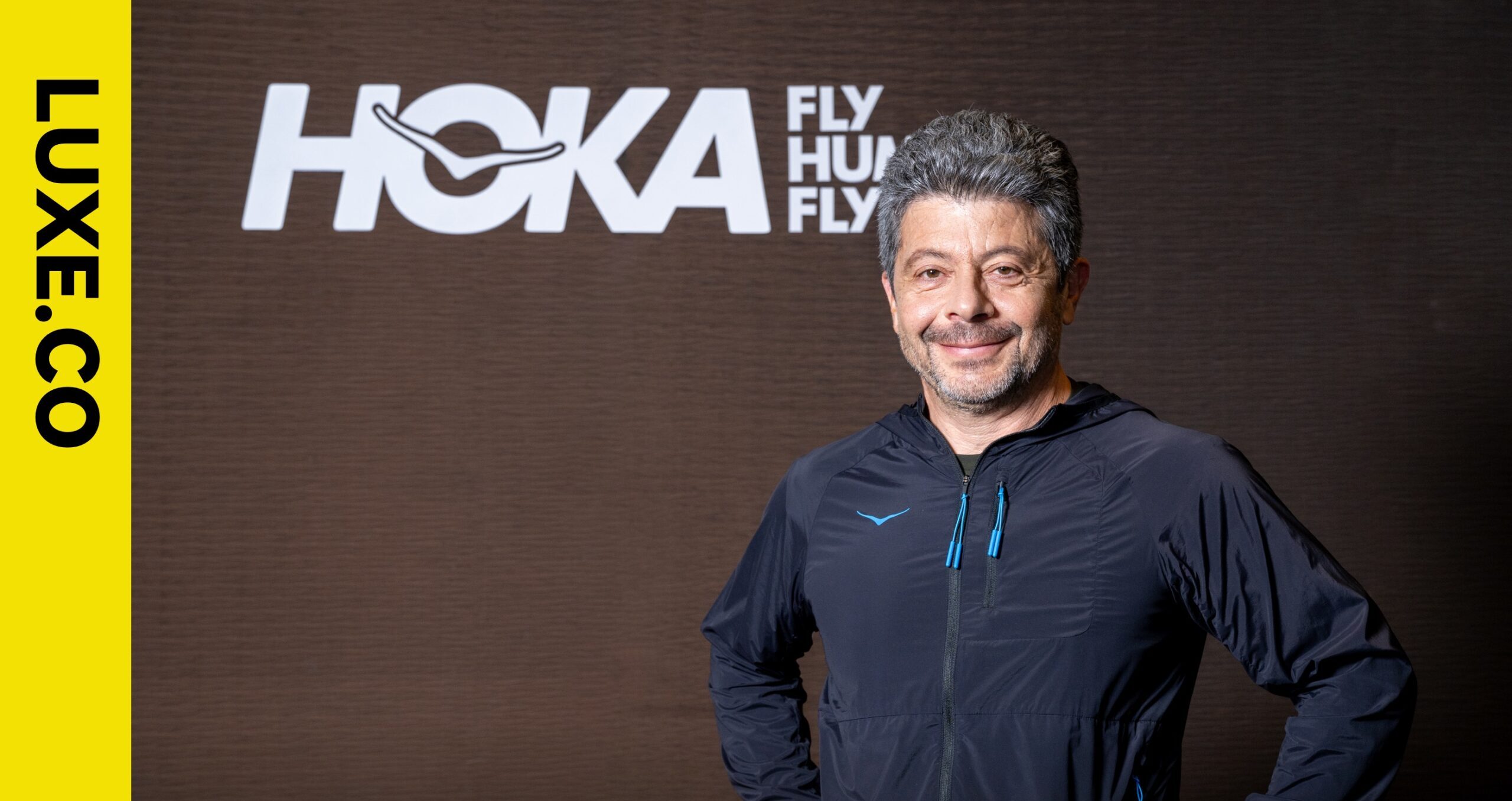After more than three years of bold and comprehensive transformation, the German fashion brand BOSS is experiencing rapid growth with a promising outlook.
BOSS’s parent company, HUGO BOSS, released its financial results for the 2023 fiscal year, showing that its new growth strategy, “Claim 5,” has yielded significant results. The group’s annual revenue reached a record €4.197 billion, achieving its original goal of reaching €4 billion by 2025 two years ahead of schedule. Of this, BOSS brand revenue totaled €3.544 billion.
The group’s recently released Q3 2024 financial report indicates that despite a challenging market environment in the luxury industry, HUGO BOSS Group is still expected to achieve 1%–4% growth in 2024.

Above: Key initiatives by BOSS since the launch of the “Claim 5” growth strategy
What innovations have driven BOSS’s strong growth? And what role does the Chinese market play in this transformation?
Recently, BOSS unveiled its first flagship store in the Chinese Mainland after an extensive upgrade. This two-story store in Shanghai’s Jing An Kerry Centre is the brand’s latest global flagship, following Düsseldorf, London, Dubai, and Tokyo.
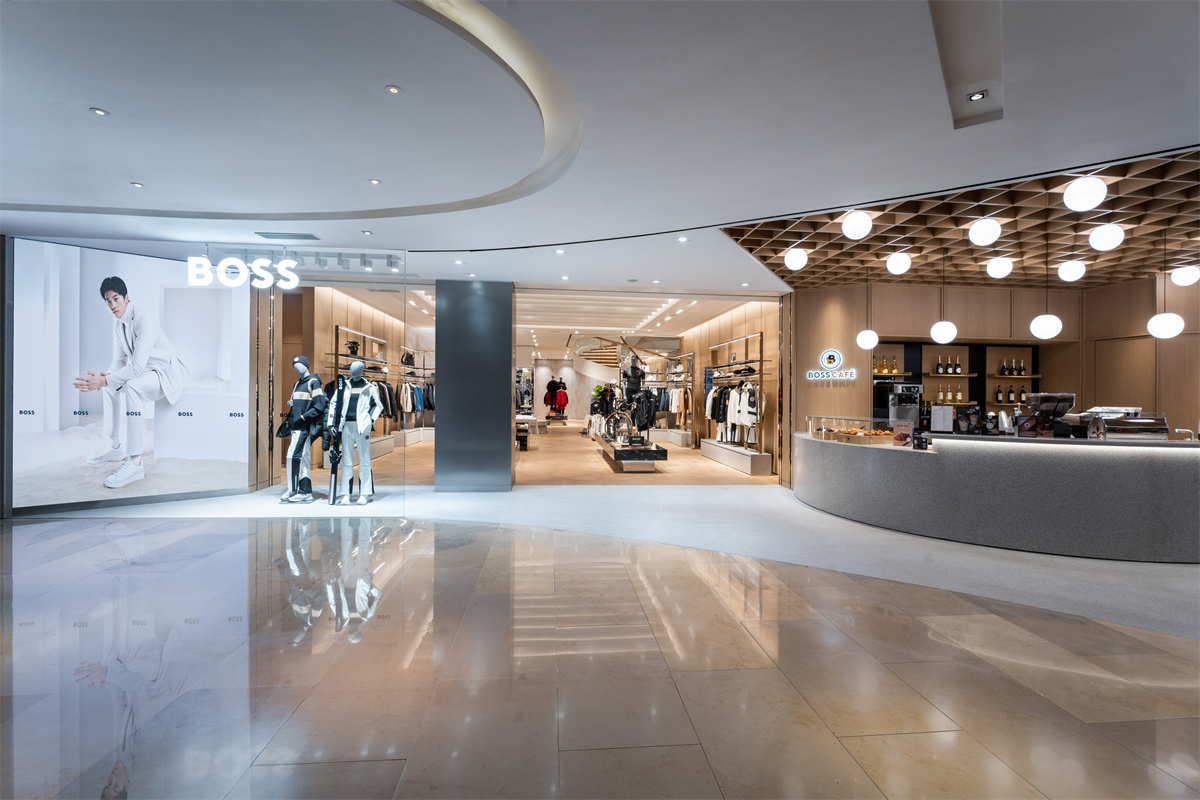
On the store’s opening day, Luxe.CO was invited for an exclusive visit. Inside, the store offers a comprehensive range of categories, including formalwear, cycling apparel, ski wear, fragrances, leather goods, and even pet accessories. The Shanghai flagship store fully presents the results of BOSS’s brand transformation.
During our visit, we also had an exclusive interview with Judith Sun, Managing Director of HUGO BOSS Greater China. She shared her insights on BOSS’s transformation and her observations on the Chinese menswear market.
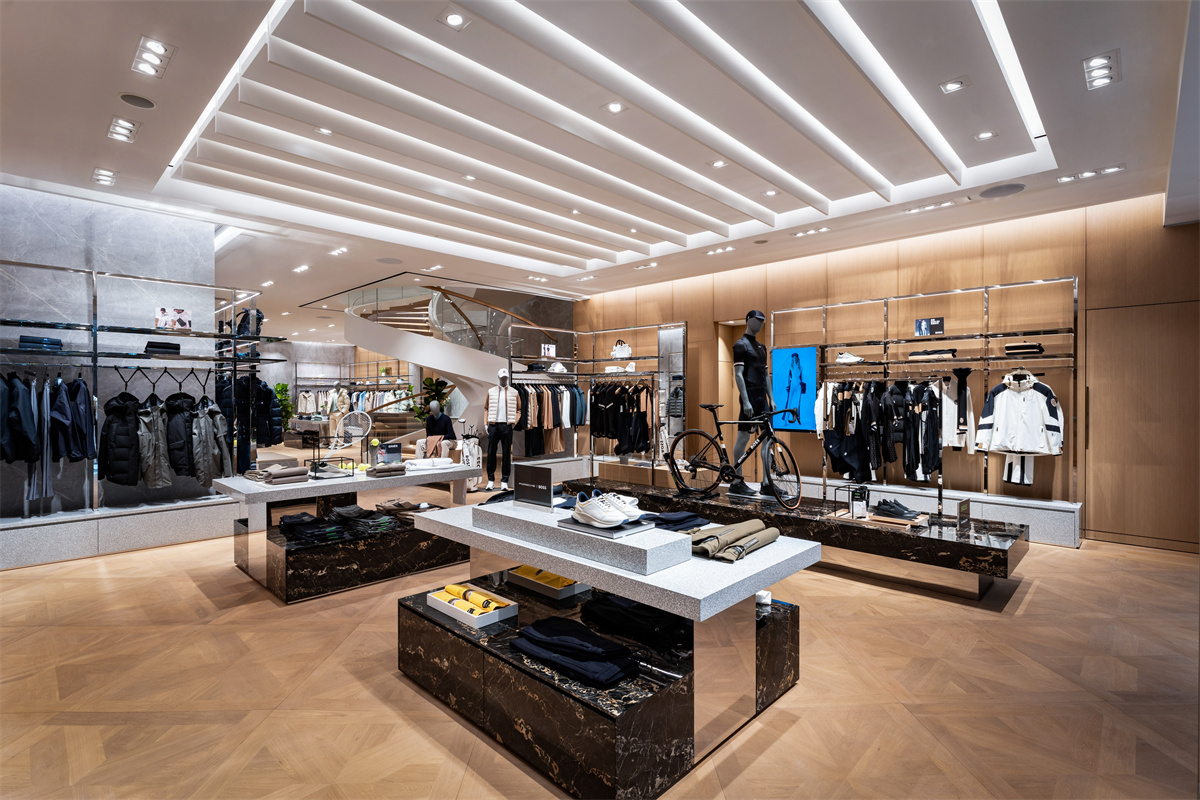
Above: Cycling apparel, golf wear, tennis wear, and ski wear displayed at the BOSS Shanghai flagship store
Judith Sun earned her bachelor’s degree from the International Business School of Shanghai University and obtained an EMBA from the Olin Business School at Washington University in St. Louis in 2008. She joined Adidas China in 2001, where she held various leadership roles, including Apparel Sales Manager, Retail Marketing Manager, Head of Business Development, and Regional Key Account Sales Director. She later served as Vice President of British apparel brand Lee Cooper China, General Manager of Distributor Channel Sales at Levi Strauss China, and Managing Director of Greater China at Austrian crystal and jewelry brand Swarovski.
“Attracting Customers with a Full Range of Products—This Is the Goal of BOSS’s Transformation”
Bold product innovation has been one of the central themes of BOSS’s transformation.
Stepping into the BOSS Shanghai flagship store, one can immediately sense that the brand is no longer solely defined by German-style formalwear. Here, customers can find apparel catering to various sports scenarios, including cycling, skiing, golf, and tennis, as well as womenswear, childrenswear, fragrances, leather goods, and pet accessories.

The presentation of multi-scenario apparel and diversified product categories aligns with the vision set forth by HUGO BOSS Group CEO Daniel Grieder for the BOSS brand: to become a “24/7 lifestyle brand” that provides attire for all occasions. He also emphasized that BOSS is positioned as “affordable luxury.”
To achieve this goal, BOSS has developed a product portfolio that comprehensively covers different aspects of everyday life, including:
- The Black line, which extends from formalwear tailoring to high-end fashion and serves as a key pillar of the brand’s business. This includes the Performance collection, which integrates technical fabrics and innovative details for functional business wear.
- The Orange line is primarily focused on casualwear.
- The Green line, which emphasizes outdoor and sportswear.
- The Camel line, the brand’s most premium collection, featuring carefully selected high-end materials.
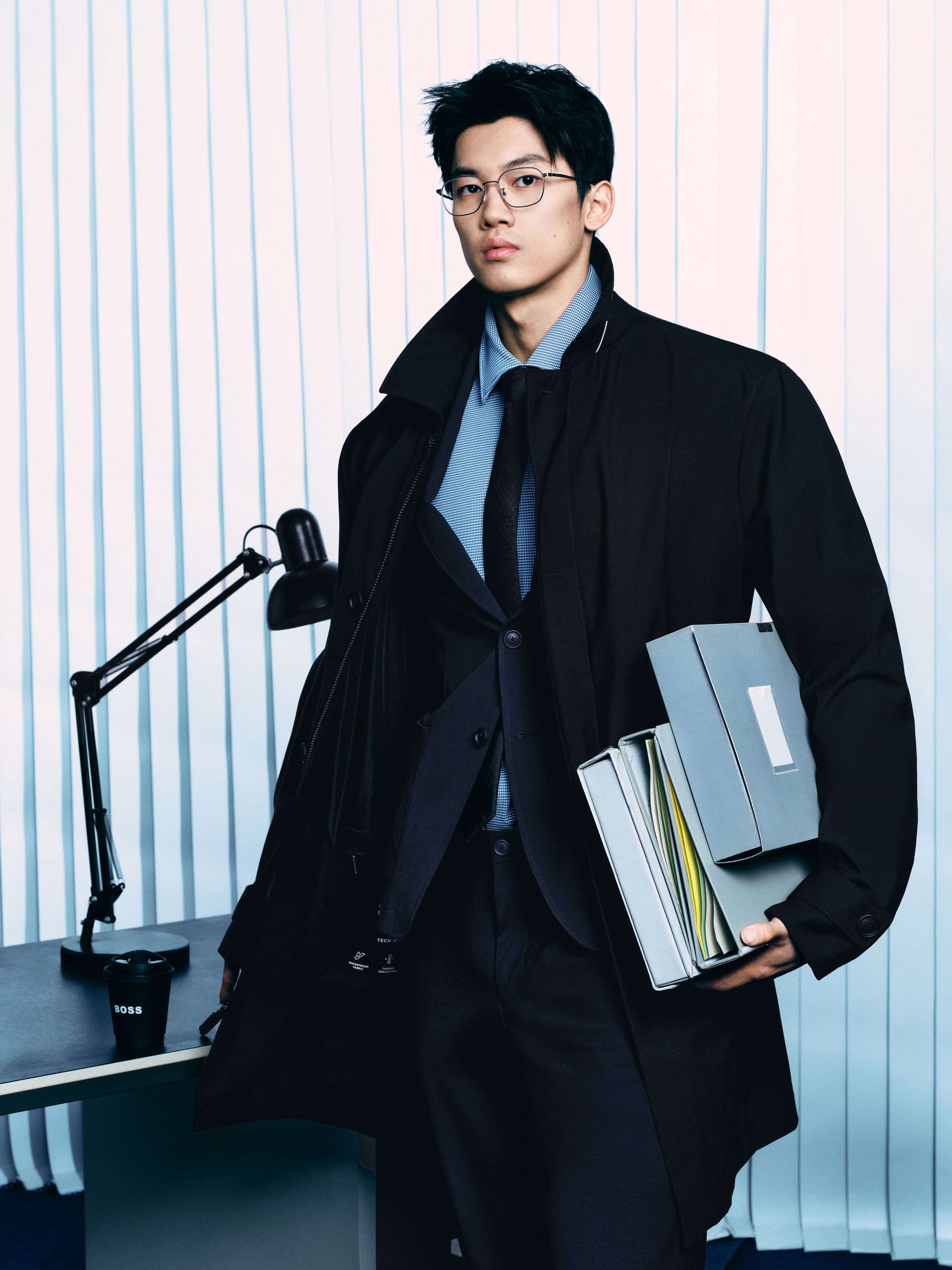
Above: BOSS brand ambassador Wang Shun in the BOSS Performance business wear campaign
In May 2024, BOSS announced a multi-year global design collaboration with David Beckham, appointing him as a guest designer. Beckham will contribute to capsule and seasonal collections, driving the evolution of BOSS’s menswear line over the coming years.
Beyond menswear, womenswear has also become a key focus for BOSS in recent years. In the 2023 fiscal year, BOSS’s womenswear revenue reached €288 million, with a goal of increasing this figure to approximately €400 million by 2025.

Above: BOSS Greater China brand ambassador Zhang Binbin in the Fall/Winter 2024 premium Camel collection
Luxe.CO: What is the strategy behind BOSS’s multi-category expansion?
Judith Sun: Through Black, Orange, Green, and Camel product lines, we can attract different consumers at various price points, but the prerequisite is that we do not compromise on quality.
We have always said that growth comes from two main sources: one is that the brand can offer more to the same group of consumers, and the other is that it can attract new consumers through its core product categories.
This means that if a consumer previously only knew BOSS for its suits, they will discover that we also offer golf wear and cycling apparel after visiting this flagship store. Moreover, their wife and children can also shop here, allowing the whole family to coordinate their outfits.
Attracting customers with a full range of products is the goal of BOSS’s transformation. This also means that BOSS’s growth can come from two directions. On one hand, we can attract new customers through our brand DNA. As a German formalwear brand, BOSS’s classic suits are well-tailored and offer great value for money, making them appealing to young professionals in the early stages of their careers. Their first suit will likely be a BOSS suit. Alternatively, through our expanded product categories, including sportswear and casualwear, we can also attract customers.
On the other hand, we can offer existing customers a wider range of product choices. For our loyal customers, a full-category approach changes their perception of BOSS, leading to increased repurchases.
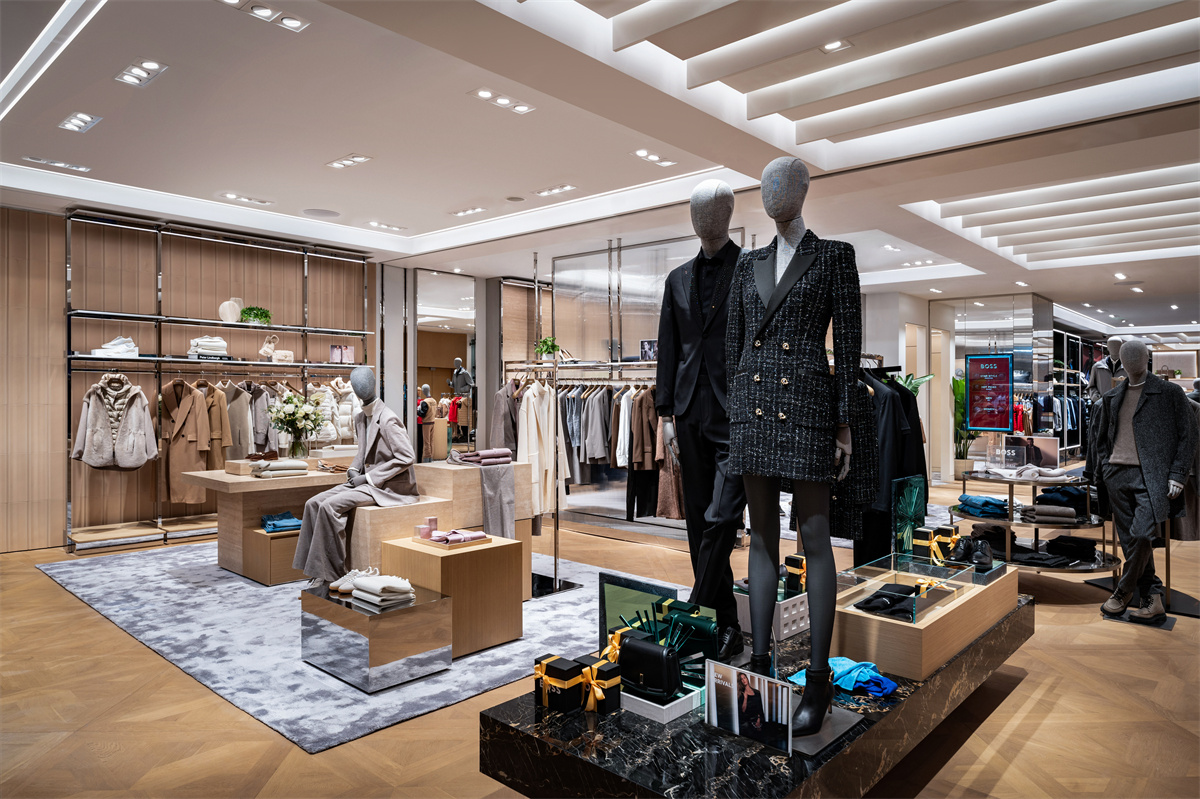
Luxe.CO: Which BOSS products are currently most popular among consumers?
Judith Sun: Formalwear and standalone blazers, which are deeply rooted in our brand DNA, remain key categories that attract both new customers and repeat buyers.
Outerwear is another highly important business category, whether it’s business-casual styles or more functional designs.
Additionally, polo shirts—especially those in the Camel premium collection—are highly favored by business professionals and millennial consumers.
Luxe.CO: What does BOSS’s consumer profile in China look like today?
Judith Sun: Thanks to our category expansion, BOSS’s customer base now spans a wide range of ages.
However, our core target audience remains the millennial generation, which is driving China’s economic and social development. These people could be entrepreneurs, business owners, or professionals in their career growth phase.
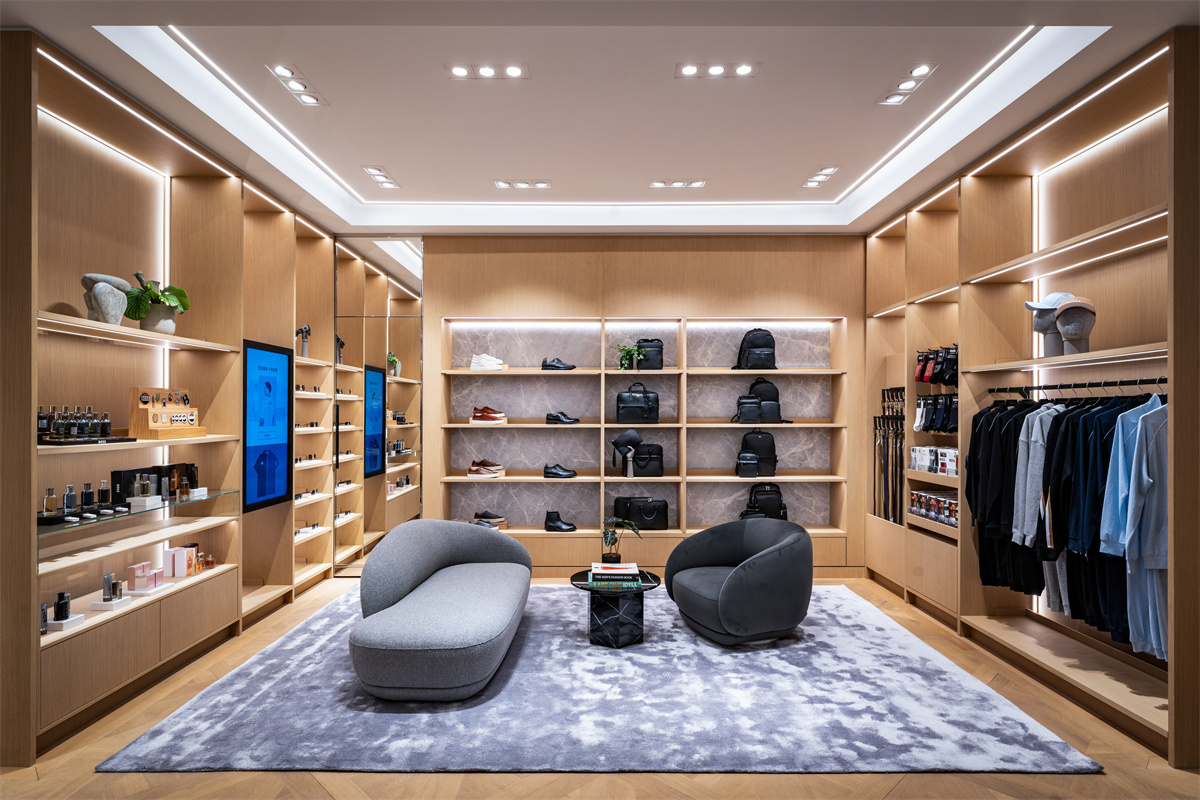
Above: Fragrance, leather goods, and accessories section at the BOSS Shanghai flagship store
“China Is Not a Single Market, but Multiple Markets”
The “Claim 5” strategy highlights that the Chinese market and Chinese consumers are top priorities for HUGO BOSS Group.
Although China’s share of the group’s overall sales still has significant room for growth, Judith Sun emphasized during the interview: “China is a strategic market for BOSS.”
BOSS officially entered the Chinese Mainland market in 1994, opening its first brick-and-mortar store in Shanghai.
Over the past 30 years of deep market engagement, BOSS has witnessed the rapid development of China’s menswear industry. Today, Chinese men have significantly improved their sense of style, and the demand for high-quality, well-designed menswear is more visible than ever.
According to Euromonitor, China’s menswear market reached RMB 566.1 billion (approximately USD 78.6 billion) in 2023. The mid-to-high-end segment has been continuously gaining market share from mass-market brands, with China’s high-end menswear market reaching RMB 51.1 billion (approximately USD 7.1 billion). From 2018 to 2023, this segment grew at a compound annual growth rate (CAGR) of 12%, increasing its market share from 6.5% in 2018 to 9.1% in 2023.
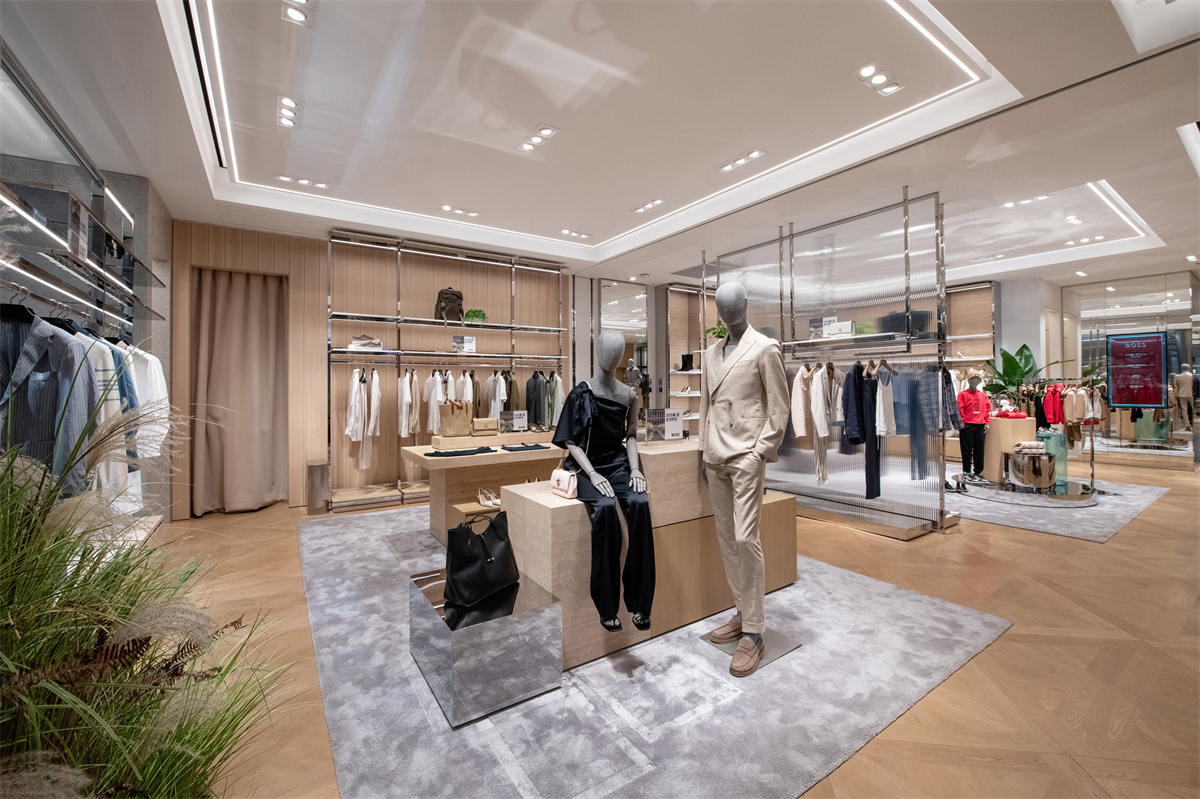
Above: Womenswear and childrenswear collections displayed at the BOSS Shanghai flagship store
Luxe.CO: What challenges does BOSS face in the Chinese market?
Judith Sun: The Chinese market is highly complex and fiercely competitive. When communicating with our headquarters, we often emphasize that China is not a single market but multiple markets.
This means that when resources are limited, we must make strategic decisions on where to invest and continuously adjust our approach.
For example, suppose we launch an advertising campaign or a capsule collection. In that case, we must closely monitor its performance—tracking how well it is received, how the products sell, and whether these efforts are truly effective. We then adjust by eliminating unsuccessful attempts and doubling down on successful ones to keep moving forward.
Luxe.CO: How does BOSS capture consumer attention in an increasingly competitive Chinese menswear market?
Judith Sun: The biggest differentiation for a menswear brand lies in brand value because factors like fabric and product categories are things that almost every brand can offer.
BOSS already has a certain level of brand awareness in China, so our task is to continuously communicate our brand value and identity to consumers. We need to showcase our century-old legacy of innovation, telling consumers not only who BOSS is but also how the brand is evolving.
However, this evolution does not mean becoming an entirely different brand—instead, BOSS is becoming better, stronger, and more clearly defined. This approach is what will truly capture consumer interest.

Above: BOSS collaborated with Chinese artist Feng Tang to create a calligraphy piece that interprets the brand’s spirit using traditional Chinese art forms.
Luxe.CO: What insights has BOSS gained in engaging with Chinese consumers?
Judith Sun: In China, brands must build deeper emotional connections with consumers.
On one hand, we offer a wider range of products that align with local consumer needs while also focusing on incorporating Chinese cultural elements during traditional festivals to engage in meaningful dialogues with our audience. This is a key strategic approach.
On the other hand, we are actively investing in digital channels. On platforms like Douyin (Chinese TikTok), we conduct daily live streams to explain products. We also leverage scenario-based, brand-driven, and entertainment-style live broadcasts to share BOSS’s brand story.

Above: BOSS launched a special crossover collection in collaboration with the film IP Creation of the Gods Trilogy. The collection features a classic red-and-black color scheme, the iconic “Jijin” gold from the Creation of the Gods aesthetic system, and custom totem patterns inspired by Shang and Zhou dynasty bronzeware, which are integrated into the brand’s emblem and Double B hinge logo.
“Providing a One-Stop Shopping Experience”
Experience is a recurring keyword that Judith Sun frequently mentioned when discussing the BOSS Shanghai flagship store.
“In the past, BOSS in China was primarily present in the form of sales points. With this flagship store, we hope to gradually shift from purely selling products to providing an experience,” she said.
Beyond offering a “one-stop” shopping experience, the first floor of the Shanghai flagship store features Asia’s first BOSS CAFÉ, designed with natural oak and terrazzo (pictured below). The café serves coffee, wine, sparkling wine, bread, pastries, and desserts.
On the second floor, BOSS has established a made-to-measure area, providing tailoring and customization services for customers.
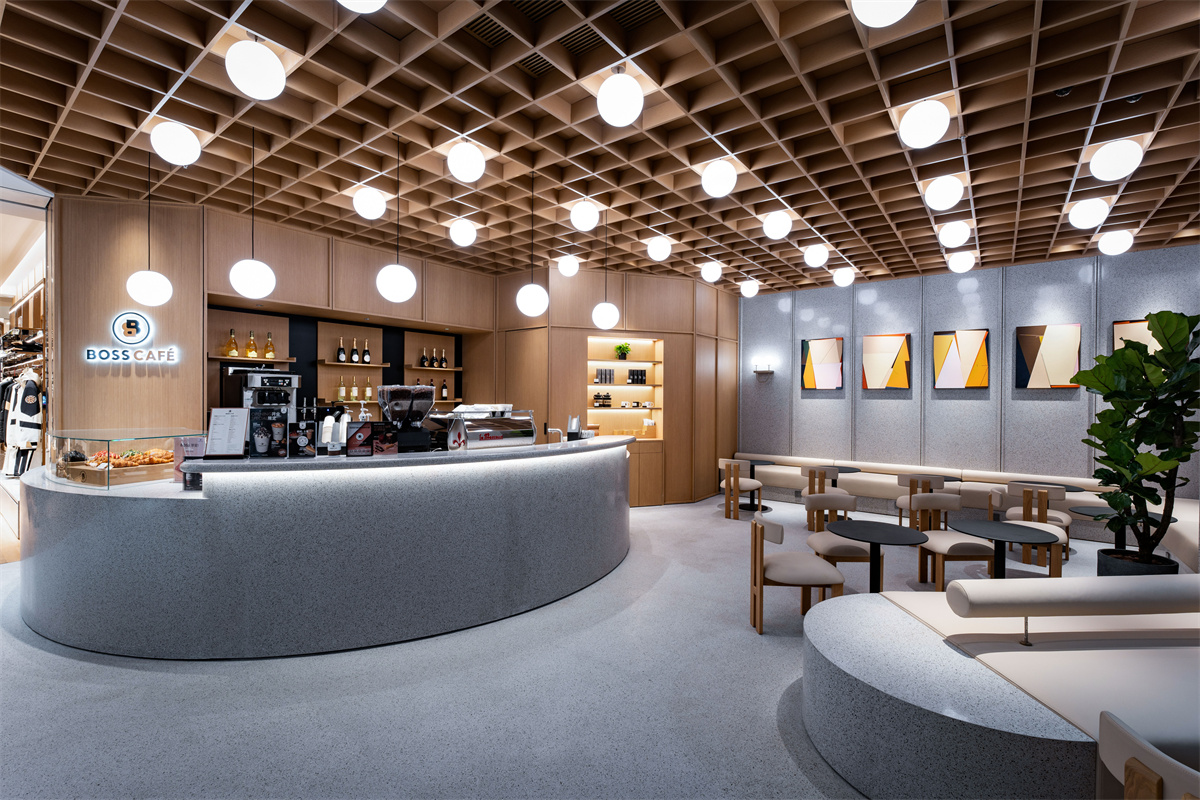
Luxe.CO: What are the brand’s expectations for this store?
Judith Sun: We hope this store will serve as a brand showcase and deliver a compelling consumer experience and tangible business results. Commercial performance is the most critical measure of a brand’s penetration into consumer consciousness.
Luxe.CO: Why was Shanghai’s Jing An Kerry Centre chosen as the location for BOSS’s first flagship store in China?
Judith Sun: First, Shanghai is China’s fashion and commercial hub. It is a highly competitive market in which global luxury and high-end brands vie for presence.
Second, Nanjing West Road is one of Shanghai’s most vibrant commercial districts, and Kerry Centre is among the area’s most dynamic shopping malls. It attracts a high-end, lifestyle-oriented clientele and houses some of the world’s top brands, making it a perfect fit for BOSS’s brand positioning.
Through this strategic location, we also aim to convey BOSS’s upscale brand evolution to the market.
Beyond Shanghai, there are many other key cities in China’s fashion industry, and we are actively monitoring and planning further expansions.

Above: Selection of menu items from BOSS CAFÉ
Conclusion
With China’s economic growth and evolving aesthetic preferences, men are placing greater emphasis on style and fashion, becoming more willing to invest in their appearance. This shift continues to drive the expansion of China’s menswear industry.
However, compared to the women’s market, men’s clothing faces a higher degree of product homogenization. As a result, strengthening brand identity has become the key to standing out in this competitive space.
As Judith Sun pointed out, brand identity is ultimately the deciding factor in menswear consumption. “Why would a consumer choose your brand? It’s because they resonate with the brand and align with the values conveyed through its marketing.”
| Image Credit: Provided by the brand
| Editor: Elisa

